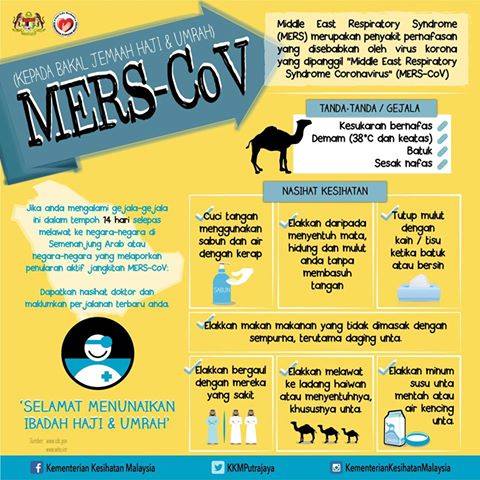Malaysian health officials have confirmed a case of Middle East Respiratory Syndrome (MERS-CoV) infection in a returning Umrah pilgrim, according to a release from director-general Datuk Dr Noor Hisham Abdullah today (computer translated).

The patient, a 55-year-old patient from Selangor, returned home from the pilgrimage on Dec. 23. On December 24, 2017, he had symptoms of fever, cough, weakness, fatigue and leg pain. The patient sought treatment from the clinic near his home, where he had received treatment as a fever case. Later on 28 December 2017, he came to Tengku Ampuan Rahimah Hospital (HTAR), Klang Hospital and he was admitted to the HTAR ward for further examination and treatment.
Recognizing the history of his new journey back from performing Umrah, the MERS-CoV screening test was carried out and it was positive, respectively, for the screening test conducted by the Sungai Buloh Hospital on 30 December 2017 as well as subsequent verification tests conducted by the Institute for Medical Research (IMR ) on 31 December 2017. Currently, the patient is in stable condition and has been referred to Sungai Buloh Hospital for further treatment. The patient has informed that while in the Holy Land, he was taken to a camel farm, where he then drank raw camel milk and came in contact with the camels found on the farm.
MOH is in the process of preventing and controlling activities, including detection and monitoring of close contacts to patients such as family members, Umrah pilgrims in the same group, healthcare professionals in treating healthcare and close contact in patients on board. Prevention and control of infections among health workers have been enhanced at all levels as well as monitoring the health status of health personnel involved in handling related cases. Recent developments about those involved will be communicated from time to time.
According to the reports by World Health Organisation (WHO), it was still uncertain as to what causes the spread of MERS-CoV.
“Activities such as touching camels, eating and drinking raw or not perfectly cooked camel products such as milk and meat, will risk a person of having MERS-CoV infection.
“WHO also stressed that the spread of the infection is still unknown and there is no vaccine for MERS-CoV infection, as well as no specific medicine to treat it.”
“WHO also does not issue any travel advice or travel restrictions to the countries’ involved.” he said.
The Umrah is an Islamic pilgrimage to Mecca, Hijaz, Saudi Arabia, performed by Muslims that can be undertaken at any time of the year.
Related:




Hence the utmost importance of buying pasteurized milk from established brands sold in trusted supermarkets, like it is in Dubai, UAE